Deck 1: The Derivative
Question
Question
Question
Question
Question
Question
Question
Question
Question
Question
Question
Question
Question
Question
Question
Question
Question
Question
Question
Question
Question
Question
Question
Question
Question
Question
Question
Question
Question
Question
Question
Question
Question
Question
Question
Question
Question
Question
Question
Question
Question
Question
Question
Question
Question
Question
Question
Question
Question
Question
Question
Question
Question
Question
Question
Question
Question
Question
Question
Question
Question
Question
Question
Question
Question
Question
Question
Question
Question
Question
Question
Question
Question
Question
Question
Question
Question
Question
Question
Question

Unlock Deck
Sign up to unlock the cards in this deck!
Unlock Deck
Unlock Deck
1/189
Play
Full screen (f)
Deck 1: The Derivative
1
Find the equation of the following line: Slope is 3; y-intercept is 5.
Enter your answer in slope-intercept form.
Enter your answer in slope-intercept form.
y = 3x + 5
2
Find the equation of the following line: Perpendicular to 5x = 7 - 8y; y-intercept is -2.
Enter your answer in slope-intercept form with any fractions in the form in lowest terms.
in lowest terms.
Enter your answer in slope-intercept form with any fractions in the form
 in lowest terms.
in lowest terms.y =  x - 2
x - 2
 x - 2
x - 2 3
Find the slope of the line with the equation y = 4 - 5x.
Enter just an integer.
Enter just an integer.
-5
4
Find the slope of the line with equation 3y + 2 = 5x - 2y?
A) -
B)
C) 5
D) 1
A) -
B)
C) 5
D) 1

Unlock Deck
Unlock for access to all 189 flashcards in this deck.
Unlock Deck
k this deck
5
Find the equation of the following line:  and
and  on the line (in the xy -plane).
on the line (in the xy -plane).
Enter your equation in the simplest possible form.
 and
and  on the line (in the xy -plane).
on the line (in the xy -plane).Enter your equation in the simplest possible form.

Unlock Deck
Unlock for access to all 189 flashcards in this deck.
Unlock Deck
k this deck
6
Find the equation of the following line:  and (2, 0) on line.
and (2, 0) on line.
Enter your answer in point-slope form using .
.
 and (2, 0) on line.
and (2, 0) on line.Enter your answer in point-slope form using
 .
.
Unlock Deck
Unlock for access to all 189 flashcards in this deck.
Unlock Deck
k this deck
7
Find the equation of the following line: Parallel to y = - x + 8; (4, 4) on line.
A) y = - x + 5
B) y = - 4x - 20
C) y = x - 5
D) y = - x - 5
A) y = - x + 5
B) y = - 4x - 20
C) y = x - 5
D) y = - x - 5

Unlock Deck
Unlock for access to all 189 flashcards in this deck.
Unlock Deck
k this deck
8
Find the slope of the line with the equation 2x + 4y = 5.
Enter just a fraction of form in lowest terms.
in lowest terms.
Enter just a fraction of form
 in lowest terms.
in lowest terms.
Unlock Deck
Unlock for access to all 189 flashcards in this deck.
Unlock Deck
k this deck
9
Find the slope of the line with equation 2x + 4 = 2(2y + 3).
Enter just a fraction of form in lowest terms.
in lowest terms.
Enter just a fraction of form
 in lowest terms.
in lowest terms.
Unlock Deck
Unlock for access to all 189 flashcards in this deck.
Unlock Deck
k this deck
10
Find the equation of the following line: Slope is -  ;
;  on line.
on line.
Enter your answer in point-slope form.
 ;
;  on line.
on line.Enter your answer in point-slope form.

Unlock Deck
Unlock for access to all 189 flashcards in this deck.
Unlock Deck
k this deck
11
Which of the following is/are true of the lines 2x - 5y = -15 and 5x + 2y = 6? (I) They are parallel.
(II) They are perpendicular.
(III) They cross the x-axis at the same point.
(IV) They cross the y-axis at the same point.
A) I
B) II and III
C) II
D) II and IV
E) none of these
(II) They are perpendicular.
(III) They cross the x-axis at the same point.
(IV) They cross the y-axis at the same point.
A) I
B) II and III
C) II
D) II and IV
E) none of these

Unlock Deck
Unlock for access to all 189 flashcards in this deck.
Unlock Deck
k this deck
12
Find the equation of the following line: (2, 3) and (4, 6) on line.
Enter your answer in slope-intercept form.
Include both the slope and the intercept in your equation.
Enter your answer in slope-intercept form.
Include both the slope and the intercept in your equation.

Unlock Deck
Unlock for access to all 189 flashcards in this deck.
Unlock Deck
k this deck
13
Find the equation of the following line: Perpendicular to - 8x + y - 3 = 0; (4, 3) on line.
A) y = - x -
B) y = - 8x - 28
C) y = - x +
D) y = x -
A) y = - x -
B) y = - 8x - 28
C) y = - x +
D) y = x -

Unlock Deck
Unlock for access to all 189 flashcards in this deck.
Unlock Deck
k this deck
14
Find the equation of the following line: Perpendicular to y = x + 8; (2, 3) on line.
A) y = - 5x + 13
B) y = 5x - 13
C) y = - x -
D) y = - 5x - 13
A) y = - 5x + 13
B) y = 5x - 13
C) y = - x -
D) y = - 5x - 13

Unlock Deck
Unlock for access to all 189 flashcards in this deck.
Unlock Deck
k this deck
15
Consider 2 lines each having slope , one passing through the point (-1, 2) and the other through (3, 5). Which of the following is/are true?
(I) They are parallel.
(II) They are the same line.
(III) They cross the x-axis at the same point.
(IV) They intersect at the point (0, 3).
A) I
B) IV
C) II
D) III
E) none of these
(I) They are parallel.
(II) They are the same line.
(III) They cross the x-axis at the same point.
(IV) They intersect at the point (0, 3).
A) I
B) IV
C) II
D) III
E) none of these

Unlock Deck
Unlock for access to all 189 flashcards in this deck.
Unlock Deck
k this deck
16
Find the equation of the following line: Perpendicular to 3y -  x = 1; y-intercept is
x = 1; y-intercept is  .
.
Enter your answer in slope-intercept form.
 x = 1; y-intercept is
x = 1; y-intercept is  .
.Enter your answer in slope-intercept form.

Unlock Deck
Unlock for access to all 189 flashcards in this deck.
Unlock Deck
k this deck
17
Find the equation of the following line: Parallel to y = - 9x + 4; (2, - 2) on line.
A) y = 9x - 16
B) y = - 9x - 16
C) y = - 9x + 16
D)
A) y = 9x - 16
B) y = - 9x - 16
C) y = - 9x + 16
D)

Unlock Deck
Unlock for access to all 189 flashcards in this deck.
Unlock Deck
k this deck
18
Each of the lines (I), (II), (III), and (IV) in the figure below is the graph of one of the equations (i), (ii), (iii), and (iv). Match each equation with its graph. (a) x + y = 3 (b) x - y = 3 (c) x + y = -3 (d) x - y = -3 
A)
(a) IV
(b) III
(c) II
(d) I
B)
(a) II
(b) III
(c) I
(d) IV
C)
(a) I
(b) II
(c) III
(d) IV
D)
(a) III
(b) II
(c) IV
(d) I

A)
(a) IV
(b) III
(c) II
(d) I
B)
(a) II
(b) III
(c) I
(d) IV
C)
(a) I
(b) II
(c) III
(d) IV
D)
(a) III
(b) II
(c) IV
(d) I

Unlock Deck
Unlock for access to all 189 flashcards in this deck.
Unlock Deck
k this deck
19
Find the equation of the following line: Parallel to ; (4, 3) on line.
A) y = - x -
B) y = 6x - 27
C) y = - 6x - 27
D) y = - 6x + 27
A) y = - x -
B) y = 6x - 27
C) y = - 6x - 27
D) y = - 6x + 27

Unlock Deck
Unlock for access to all 189 flashcards in this deck.
Unlock Deck
k this deck
20
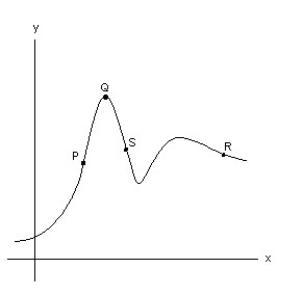
-The average value of a certain type of automobile was $15,780 in 1994 and depreciated to $5400 in 1999. Let y be the average value of the automobile in the year x, where x = 0 represents 1994. Write a linear equation in slope-intercept form that models the value of the automobile, y, x years after 1994.
A) y = - x - 5400
B) y = -2076x + 5400
C) y = -2076x - 4980
D) y = -2076x + 15,780
Referring to the graph above , assign one of the following descriptors to the point: large positive slope, small positive slope, zero slope, small negative slope, large negative slope.

Unlock Deck
Unlock for access to all 189 flashcards in this deck.
Unlock Deck
k this deck
21
Find all points on the graph of y =  where the curve has slope 12. The slope of the tangent line to the graph is 3
where the curve has slope 12. The slope of the tangent line to the graph is 3  .
.
Enter your answer exactly in the form: (a, b), (c, d) where a > c.
 where the curve has slope 12. The slope of the tangent line to the graph is 3
where the curve has slope 12. The slope of the tangent line to the graph is 3  .
.Enter your answer exactly in the form: (a, b), (c, d) where a > c.

Unlock Deck
Unlock for access to all 189 flashcards in this deck.
Unlock Deck
k this deck
22
If (x,y) is a point on the parabola y = 3 , then the tangent line to y = 3 passing through (x,y) has slope 6x. Find the equation of the line tangent to y = 3 through the point (-2, 12).
A) y = 6x + 12
B) y = 12x + 6
C) y = -12x - 12
D) y = -2x + 12
A) y = 6x + 12
B) y = 12x + 6
C) y = -12x - 12
D) y = -2x + 12

Unlock Deck
Unlock for access to all 189 flashcards in this deck.
Unlock Deck
k this deck
23
Which of the following lines is/are parallel to the tangent line of the graph of at the point where and the slope of the tangent line is .
(I) y = -3x + 1
(II) y = 3x + 1
(III) y = -3x - 4
(IV) y = 3x + 1
A) (II) and (III)
B) (I) and (III)
C) (I) and (II)
D) (III) and (IV)
E) none of these
(I) y = -3x + 1
(II) y = 3x + 1
(III) y = -3x - 4
(IV) y = 3x + 1
A) (II) and (III)
B) (I) and (III)
C) (I) and (II)
D) (III) and (IV)
E) none of these

Unlock Deck
Unlock for access to all 189 flashcards in this deck.
Unlock Deck
k this deck
24

S
A) large positive slope
B) large negative slope
C) small negative slope
D) zero slope

Unlock Deck
Unlock for access to all 189 flashcards in this deck.
Unlock Deck
k this deck
25
Find the derivative of f(x) = 7x - 19 at x = 2.
A) 9
B) 14
C) 34
D) 7
A) 9
B) 14
C) 34
D) 7

Unlock Deck
Unlock for access to all 189 flashcards in this deck.
Unlock Deck
k this deck
26
Find the derivative of f(x) =  .
.
Enter your answer exactly in the form: a
 .
.Enter your answer exactly in the form: a


Unlock Deck
Unlock for access to all 189 flashcards in this deck.
Unlock Deck
k this deck
27
Find the derivative of f(x) =  .
.
Enter your answer exactly in the form: where a, b are integers. Do not use parentheses.
where a, b are integers. Do not use parentheses.
 .
.Enter your answer exactly in the form:
 where a, b are integers. Do not use parentheses.
where a, b are integers. Do not use parentheses.
Unlock Deck
Unlock for access to all 189 flashcards in this deck.
Unlock Deck
k this deck
28
Find the derivative of f(x) = 4  .
.
Enter your answer in the form: , where a, b are either fractions in lowest terms or integers. No parentheses.
, where a, b are either fractions in lowest terms or integers. No parentheses.
 .
.Enter your answer in the form:
 , where a, b are either fractions in lowest terms or integers. No parentheses.
, where a, b are either fractions in lowest terms or integers. No parentheses.
Unlock Deck
Unlock for access to all 189 flashcards in this deck.
Unlock Deck
k this deck
29
Find the derivative of f(x) = 2 at x = 4.
A) -
B)
C) -1
D) 2
A) -
B)
C) -1
D) 2

Unlock Deck
Unlock for access to all 189 flashcards in this deck.
Unlock Deck
k this deck
30
Find the slope of the tangent line to the graph of y =  at the point (0.9, 0.81) and write the equation of the tangent line.
at the point (0.9, 0.81) and write the equation of the tangent line.
Enter your answer exactly as just the equation in standard point-slope form.
 at the point (0.9, 0.81) and write the equation of the tangent line.
at the point (0.9, 0.81) and write the equation of the tangent line.Enter your answer exactly as just the equation in standard point-slope form.

Unlock Deck
Unlock for access to all 189 flashcards in this deck.
Unlock Deck
k this deck
31

P
A) large positive slope
B) small negative slope
C) small positive slope
D) large negative slope

Unlock Deck
Unlock for access to all 189 flashcards in this deck.
Unlock Deck
k this deck
32

R
A) small positive slope
B) small negative slope
C) zero slope
D) large negative slope
Solve the problem.

Unlock Deck
Unlock for access to all 189 flashcards in this deck.
Unlock Deck
k this deck
33
Find the slope of the curve y = at x = -3.
A) slope = -4374
B) slope = -1458
C) slope = 1458
D) slope = 4374
A) slope = -4374
B) slope = -1458
C) slope = 1458
D) slope = 4374

Unlock Deck
Unlock for access to all 189 flashcards in this deck.
Unlock Deck
k this deck
34
Find the derivative of f(x) =  .
.
Enter your answer exactly in the form: a . Do not use parentheses.
. Do not use parentheses.
No parentheses.
 .
.Enter your answer exactly in the form: a
 . Do not use parentheses.
. Do not use parentheses.No parentheses.

Unlock Deck
Unlock for access to all 189 flashcards in this deck.
Unlock Deck
k this deck
35
Find the derivative of
A) -
B)
C)
D) none of these
A) -
B)
C)
D) none of these

Unlock Deck
Unlock for access to all 189 flashcards in this deck.
Unlock Deck
k this deck
36
Consider the curve f(x) in the accompanying sketch. 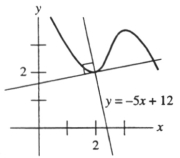 Find the slope of the tangent line at the point where x = 2.
Find the slope of the tangent line at the point where x = 2.
Enter your answer as just a fraction or an integer.
 Find the slope of the tangent line at the point where x = 2.
Find the slope of the tangent line at the point where x = 2.Enter your answer as just a fraction or an integer.

Unlock Deck
Unlock for access to all 189 flashcards in this deck.
Unlock Deck
k this deck
37
Find the derivative of f(x) = .
A) 5
B)
C)
D)
A) 5
B)
C)
D)

Unlock Deck
Unlock for access to all 189 flashcards in this deck.
Unlock Deck
k this deck
38

Q
A) large negative slope
B) small negative slope
C) zero slope
D) small positive slope

Unlock Deck
Unlock for access to all 189 flashcards in this deck.
Unlock Deck
k this deck
39
Find the slope of the tangent line to the graph of y =  at the point
at the point  and write the equation of the tangent line.
and write the equation of the tangent line.
Enter your answer exactly as just the equation in standard point-slope form. Use all fractions of form in lowest terms.
in lowest terms.
 at the point
at the point  and write the equation of the tangent line.
and write the equation of the tangent line.Enter your answer exactly as just the equation in standard point-slope form. Use all fractions of form
 in lowest terms.
in lowest terms.
Unlock Deck
Unlock for access to all 189 flashcards in this deck.
Unlock Deck
k this deck
40
Find all points at which the tangent line to the graph of y =  is parallel to the line
is parallel to the line  .
.
Enter your answer in the form: (a, b), (c, d)where a > c
 is parallel to the line
is parallel to the line  .
.Enter your answer in the form: (a, b), (c, d)where a > c

Unlock Deck
Unlock for access to all 189 flashcards in this deck.
Unlock Deck
k this deck
41
If g(t) = -  + 2t - 3, find
+ 2t - 3, find  and simplify.
and simplify.
Enter your answer exactly as a polynomial in a in standard form.
 + 2t - 3, find
+ 2t - 3, find  and simplify.
and simplify.Enter your answer exactly as a polynomial in a in standard form.

Unlock Deck
Unlock for access to all 189 flashcards in this deck.
Unlock Deck
k this deck
42
Calculate the following limit(s) if they exist.
![Calculate the following limit(s) if they exist. [ + 1) ] Enter your answer as an integer, or does not exist](https://storage.examlex.com/TB3874/11ea9846_698f_8fbc_b1f1_93039d696e2c_TB3874_11.jpg) [
[ ![Calculate the following limit(s) if they exist. [ + 1) ] Enter your answer as an integer, or does not exist](https://storage.examlex.com/TB3874/11ea9846_698f_8fbd_b1f1_f10d7f9ccbd5_TB3874_11.jpg)
![Calculate the following limit(s) if they exist. [ + 1) ] Enter your answer as an integer, or does not exist](https://storage.examlex.com/TB3874/11ea9846_698f_8fbe_b1f1_414e85e219f1_TB3874_11.jpg) + 1)
+ 1) ![Calculate the following limit(s) if they exist. [ + 1) ] Enter your answer as an integer, or does not exist](https://storage.examlex.com/TB3874/11ea9846_698f_b6cf_b1f1_254b00078514_TB3874_11.jpg) ]
]
Enter your answer as an integer, or " does not exist"
![Calculate the following limit(s) if they exist. [ + 1) ] Enter your answer as an integer, or does not exist](https://storage.examlex.com/TB3874/11ea9846_698f_8fbc_b1f1_93039d696e2c_TB3874_11.jpg) [
[ ![Calculate the following limit(s) if they exist. [ + 1) ] Enter your answer as an integer, or does not exist](https://storage.examlex.com/TB3874/11ea9846_698f_8fbd_b1f1_f10d7f9ccbd5_TB3874_11.jpg)
![Calculate the following limit(s) if they exist. [ + 1) ] Enter your answer as an integer, or does not exist](https://storage.examlex.com/TB3874/11ea9846_698f_8fbe_b1f1_414e85e219f1_TB3874_11.jpg) + 1)
+ 1) ![Calculate the following limit(s) if they exist. [ + 1) ] Enter your answer as an integer, or does not exist](https://storage.examlex.com/TB3874/11ea9846_698f_b6cf_b1f1_254b00078514_TB3874_11.jpg) ]
]Enter your answer as an integer, or " does not exist"

Unlock Deck
Unlock for access to all 189 flashcards in this deck.
Unlock Deck
k this deck
43
Calculate the following limit(s) if they exist.
 (
(  - 2x + 5).
- 2x + 5).
Enter just an integer or "does not exist".
 (
(  - 2x + 5).
- 2x + 5).Enter just an integer or "does not exist".

Unlock Deck
Unlock for access to all 189 flashcards in this deck.
Unlock Deck
k this deck
44
Which of the following is the equation of the line tangent to the curve at ?
(I) y = -x -
(II) y = x + 3
(III) y = x +
(IV) y = -
A) IV
B) III
C) I
D) II
E) none of these
(I) y = -x -
(II) y = x + 3
(III) y = x +
(IV) y = -
A) IV
B) III
C) I
D) II
E) none of these

Unlock Deck
Unlock for access to all 189 flashcards in this deck.
Unlock Deck
k this deck
45
If f(x) = 2 + 5x, find and simplify.
A) 4x + 5h + 4
B) 4x + 5xh + + 5h
C) 4x + 5 + 4 + 5h
D) 4x + 5 + 4h
E) none of these
A) 4x + 5h + 4
B) 4x + 5xh + + 5h
C) 4x + 5 + 4 + 5h
D) 4x + 5 + 4h
E) none of these

Unlock Deck
Unlock for access to all 189 flashcards in this deck.
Unlock Deck
k this deck
46
If f(x) = -2 - 3x + 2, find where h ? 0.
A)
B)
C) -4x - 2h - 3
D) -4x - 1
E) none of these
A)
B)
C) -4x - 2h - 3
D) -4x - 1
E) none of these

Unlock Deck
Unlock for access to all 189 flashcards in this deck.
Unlock Deck
k this deck
47
If g(x) = 2  - x + 3, compute g(1) and g'(1).
- x + 3, compute g(1) and g'(1).
Enter your answer exactly in the form: g(1) = a, g'(1) = b
where a,b are integers
 - x + 3, compute g(1) and g'(1).
- x + 3, compute g(1) and g'(1).Enter your answer exactly in the form: g(1) = a, g'(1) = b
where a,b are integers

Unlock Deck
Unlock for access to all 189 flashcards in this deck.
Unlock Deck
k this deck
48
Determine:  if y = 4 - 6x.
if y = 4 - 6x.
Enter your answer as just an integer.
 if y = 4 - 6x.
if y = 4 - 6x.Enter your answer as just an integer.

Unlock Deck
Unlock for access to all 189 flashcards in this deck.
Unlock Deck
k this deck
49
Calculate the following limit(s) if they exist.
 (2x + 2
(2x + 2  Enter your answer as an integer, or "does not exist".
Enter your answer as an integer, or "does not exist".
 (2x + 2
(2x + 2  Enter your answer as an integer, or "does not exist".
Enter your answer as an integer, or "does not exist".
Unlock Deck
Unlock for access to all 189 flashcards in this deck.
Unlock Deck
k this deck
50
If f(t) = 5t - 4, find  where h ≠ 0 and simplify.
where h ≠ 0 and simplify.
Enter your answer as just an integer.
 where h ≠ 0 and simplify.
where h ≠ 0 and simplify.Enter your answer as just an integer.

Unlock Deck
Unlock for access to all 189 flashcards in this deck.
Unlock Deck
k this deck
51
Calculate the following limit(s) if they exist.
 4
4  Enter your answer as an integer.
Enter your answer as an integer.
 4
4  Enter your answer as an integer.
Enter your answer as an integer.
Unlock Deck
Unlock for access to all 189 flashcards in this deck.
Unlock Deck
k this deck
52
Find the derivative of f(x) =  at x = 32.
at x = 32.
Enter just a reduced fraction or an integer.
 at x = 32.
at x = 32.Enter just a reduced fraction or an integer.

Unlock Deck
Unlock for access to all 189 flashcards in this deck.
Unlock Deck
k this deck
53
Calculate the following limit(s) if they exist.

 Enter your answer as a fraction, integer, or "does not exist".
Enter your answer as a fraction, integer, or "does not exist".

 Enter your answer as a fraction, integer, or "does not exist".
Enter your answer as a fraction, integer, or "does not exist".
Unlock Deck
Unlock for access to all 189 flashcards in this deck.
Unlock Deck
k this deck
54
What is the equation of the tangent line to the graph of y =  at the point where
at the point where  ?
?
Enter your answer in standard point-slope form.
 at the point where
at the point where  ?
?Enter your answer in standard point-slope form.

Unlock Deck
Unlock for access to all 189 flashcards in this deck.
Unlock Deck
k this deck
55
Calculate the following limit(s) if they exist.

 Enter your answer as just a fraction or an integer, or the words " does not exist"
Enter your answer as just a fraction or an integer, or the words " does not exist"

 Enter your answer as just a fraction or an integer, or the words " does not exist"
Enter your answer as just a fraction or an integer, or the words " does not exist"
Unlock Deck
Unlock for access to all 189 flashcards in this deck.
Unlock Deck
k this deck
56
Calculate the following limit(s) if they exist.

 Enter your answer as just a fraction in lowest terms or an integer, or the words "does not exist".
Enter your answer as just a fraction in lowest terms or an integer, or the words "does not exist".

 Enter your answer as just a fraction in lowest terms or an integer, or the words "does not exist".
Enter your answer as just a fraction in lowest terms or an integer, or the words "does not exist".
Unlock Deck
Unlock for access to all 189 flashcards in this deck.
Unlock Deck
k this deck
57
Calculate the following limit(s) if they exist.

 Enter your answer as just an integer or a fraction in lowest terms, or the words "does not exist".
Enter your answer as just an integer or a fraction in lowest terms, or the words "does not exist".

 Enter your answer as just an integer or a fraction in lowest terms, or the words "does not exist".
Enter your answer as just an integer or a fraction in lowest terms, or the words "does not exist".
Unlock Deck
Unlock for access to all 189 flashcards in this deck.
Unlock Deck
k this deck
58
Determine:  if y =
if y =  .
.
Enter your answer as just an integer or a reduced fraction.
 if y =
if y =  .
.Enter your answer as just an integer or a reduced fraction.

Unlock Deck
Unlock for access to all 189 flashcards in this deck.
Unlock Deck
k this deck
59
If f(x)= - + 2x - 1, find , h ? 0.
A) -2x + 2
B) -2xh - + 2h
C)
D)
E) -2x - h + 2
A) -2x + 2
B) -2xh - + 2h
C)
D)
E) -2x - h + 2

Unlock Deck
Unlock for access to all 189 flashcards in this deck.
Unlock Deck
k this deck
60
Find the derivative of f(x) =  .
.
Enter your answer in the form: a , where a, b are either fractions of the form
, where a, b are either fractions of the form  or integers. No parentheses.
or integers. No parentheses.
 .
.Enter your answer in the form: a
 , where a, b are either fractions of the form
, where a, b are either fractions of the form  or integers. No parentheses.
or integers. No parentheses.
Unlock Deck
Unlock for access to all 189 flashcards in this deck.
Unlock Deck
k this deck
61
Using the graph below, find the given limit. 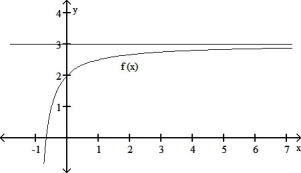
- (2f(x) - 1)
A) 6
B) 0
C) 5
D) 2

- (2f(x) - 1)
A) 6
B) 0
C) 5
D) 2

Unlock Deck
Unlock for access to all 189 flashcards in this deck.
Unlock Deck
k this deck
62
Calculate the following limit(s) if they exist.

 Enter just an integer or a fraction.
Enter just an integer or a fraction.

 Enter just an integer or a fraction.
Enter just an integer or a fraction.
Unlock Deck
Unlock for access to all 189 flashcards in this deck.
Unlock Deck
k this deck
63
Does 
 (where a ≠ 0) exist?
(where a ≠ 0) exist?
Enter your answer as either "yes" or "no" or "does not exist".

 (where a ≠ 0) exist?
(where a ≠ 0) exist?Enter your answer as either "yes" or "no" or "does not exist".

Unlock Deck
Unlock for access to all 189 flashcards in this deck.
Unlock Deck
k this deck
64
Calculate the following limit(s) if they exist.

 where
where  Enter your answer as a fraction, integer, or the words "does not exist".
Enter your answer as a fraction, integer, or the words "does not exist".

 where
where  Enter your answer as a fraction, integer, or the words "does not exist".
Enter your answer as a fraction, integer, or the words "does not exist".
Unlock Deck
Unlock for access to all 189 flashcards in this deck.
Unlock Deck
k this deck
65
For the following function g(x), determine whether or not g(x) exists. If so, give the limit. 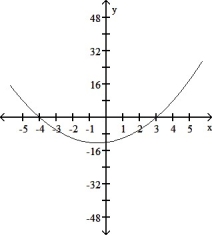
A) 2
B) -6
C) 0
D) does not exist

A) 2
B) -6
C) 0
D) does not exist

Unlock Deck
Unlock for access to all 189 flashcards in this deck.
Unlock Deck
k this deck
66
If f(t) = , then equals
A) f'(8)
B)
C) f'(0)
D) none of these
A) f'(8)
B)
C) f'(0)
D) none of these

Unlock Deck
Unlock for access to all 189 flashcards in this deck.
Unlock Deck
k this deck
67
For the following function f(x), determine whether or not f(x) exists. If so, give the limit. 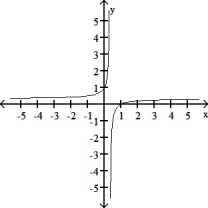
A) 0
B) -
C) 1
D) does not exist

A) 0
B) -
C) 1
D) does not exist

Unlock Deck
Unlock for access to all 189 flashcards in this deck.
Unlock Deck
k this deck
68
Calculate the following limit(s) if they exist.

 Enter just an integer or a fraction.
Enter just an integer or a fraction.

 Enter just an integer or a fraction.
Enter just an integer or a fraction.
Unlock Deck
Unlock for access to all 189 flashcards in this deck.
Unlock Deck
k this deck
69
Calculate the following limit(s) if they exist.
-
A) 0
B) 2
C) ?
D) 1
-
A) 0
B) 2
C) ?
D) 1

Unlock Deck
Unlock for access to all 189 flashcards in this deck.
Unlock Deck
k this deck
70
Determine whether or not the following limit exists. If, so compute the limit.
A) -2
B) 1
C) does not exist
D) 0
E) none of these
A) -2
B) 1
C) does not exist
D) 0
E) none of these

Unlock Deck
Unlock for access to all 189 flashcards in this deck.
Unlock Deck
k this deck
71
Calculate the following limit(s) if they exist.

 + 1
+ 1
Enter either a fraction, integer, or the words "does not exist"

 + 1
+ 1Enter either a fraction, integer, or the words "does not exist"

Unlock Deck
Unlock for access to all 189 flashcards in this deck.
Unlock Deck
k this deck
72
Using the graph below, find the given limit. ![<strong>Using the graph below, find the given limit. - \lim _ { x \rightarrow 0 } [ \mathrm { f(x) }]^2 </strong> A) 4 B) 9 C) 0 D) 6](https://storage.examlex.com/TB3874/11ea9846_6994_49d6_b1f1_bd45709e6db7_TB3874_00.jpg)
-
A) 4
B) 9
C) 0
D) 6
![<strong>Using the graph below, find the given limit. - \lim _ { x \rightarrow 0 } [ \mathrm { f(x) }]^2 </strong> A) 4 B) 9 C) 0 D) 6](https://storage.examlex.com/TB3874/11ea9846_6994_49d6_b1f1_bd45709e6db7_TB3874_00.jpg)
-
A) 4
B) 9
C) 0
D) 6

Unlock Deck
Unlock for access to all 189 flashcards in this deck.
Unlock Deck
k this deck
73
Calculate the following limit(s) if they exist.

 + 1
+ 1
Enter either a fraction in lowest terms, an integer, or "does not exist".

 + 1
+ 1Enter either a fraction in lowest terms, an integer, or "does not exist".

Unlock Deck
Unlock for access to all 189 flashcards in this deck.
Unlock Deck
k this deck
74
Calculate the following limit(s) if they exist.

 Enter either a fraction, integer, or "does not exist".
Enter either a fraction, integer, or "does not exist".

 Enter either a fraction, integer, or "does not exist".
Enter either a fraction, integer, or "does not exist".
Unlock Deck
Unlock for access to all 189 flashcards in this deck.
Unlock Deck
k this deck
75
Determine whether or not the following limit exists. If, so compute the limit.
A) does not exist
B) 0
C)
D) - 4
E) none of these
A) does not exist
B) 0
C)
D) - 4
E) none of these

Unlock Deck
Unlock for access to all 189 flashcards in this deck.
Unlock Deck
k this deck
76
Calculate the following limit(s) if they exist.

 where
where  Enter your answer as an integer, fraction in lowest terms, or the words " does not exist"
Enter your answer as an integer, fraction in lowest terms, or the words " does not exist"

 where
where  Enter your answer as an integer, fraction in lowest terms, or the words " does not exist"
Enter your answer as an integer, fraction in lowest terms, or the words " does not exist" 
Unlock Deck
Unlock for access to all 189 flashcards in this deck.
Unlock Deck
k this deck
77
Calculate the following limit(s) if they exist.

 Enter either a fraction, integer, or the words "does not exist".
Enter either a fraction, integer, or the words "does not exist".

 Enter either a fraction, integer, or the words "does not exist".
Enter either a fraction, integer, or the words "does not exist".
Unlock Deck
Unlock for access to all 189 flashcards in this deck.
Unlock Deck
k this deck
78
For the following function g(x), determine whether or not g(x) exists. If so, give the limit. 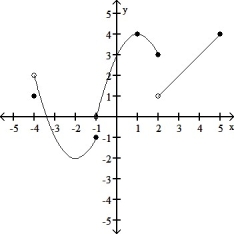
A) 3
B) 0
C) 1
D) does not exist

A) 3
B) 0
C) 1
D) does not exist

Unlock Deck
Unlock for access to all 189 flashcards in this deck.
Unlock Deck
k this deck
79
For the following function g(x), determine whether or not g(x) exists. If so, give the limit. 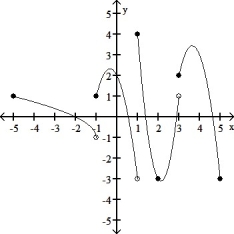
A) 2
B) 0
C) 1
D) does not exist

A) 2
B) 0
C) 1
D) does not exist

Unlock Deck
Unlock for access to all 189 flashcards in this deck.
Unlock Deck
k this deck
80
Let f(x) = . Does f(x) exist?

Unlock Deck
Unlock for access to all 189 flashcards in this deck.
Unlock Deck
k this deck


